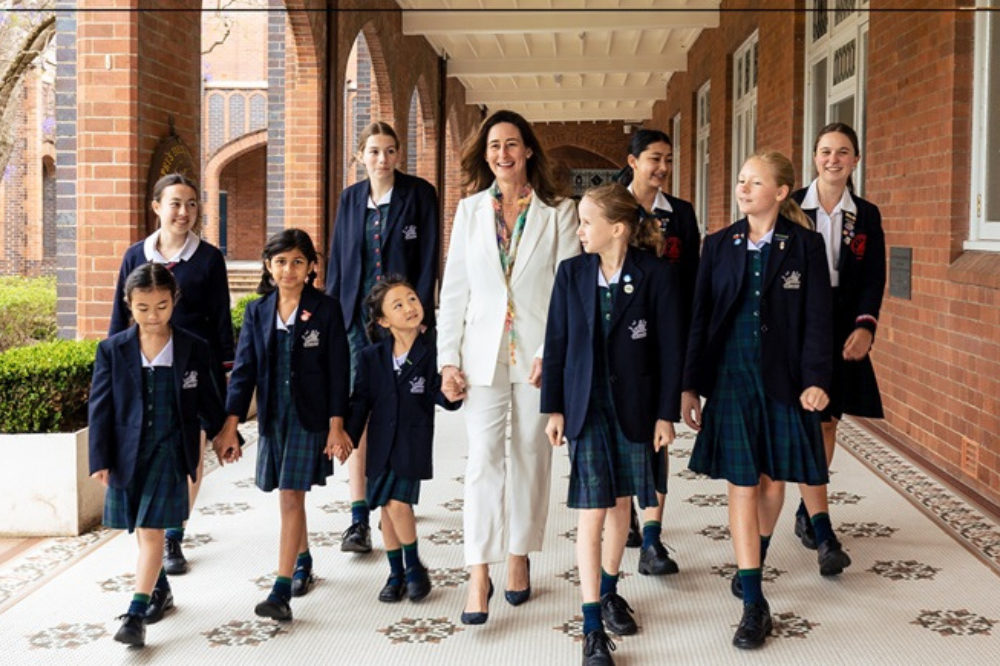
Research suggests that any more than a couple of hours in front of a screen can have a damaging impact on the brain – particularly when it comes to cognitive functions.
The latest figures show the average Australian teenager is spending four to six hours a day on social media, and a total of up to eight hours a day using screens for leisure.
The Federal Government’s response to this has been to ban mobile phones from school classrooms – a measure some experts say constitutes a simple but ineffective a solution.
As world-renowned education expert Professor Pasi Sahlberg has pointed out, most of ‘screen time’ takes place outside of school, so simply taking the gadgets away from kids in school would not help.
This issue, says Professor Sahlberg, is best handled in close collaboration with children and their parents.
Recognising this, one Sydney girls’ school has adopted a novel approach by introducing a purpose-built phone that combines essential features with safeguards against distractions like social media and internet browsing.
The best of both worlds
The Pymble Ladies’ College’s (PLC) ‘Wise Phone’ was designed with age-specific functionality tailored to students’ needs, the initiative aims to promote balanced technology use and ensure a safer digital environment.
“Like many heads of schools, I am increasingly concerned about the harm being caused to our young people through unfettered access to social media and the internet on their smartphones before they reach the maturity to use these tools wisely,” Dr Hadwen told The Educator.
“We spoke to a group of our Year 9 students, who courageously acknowledged the negative impact of phone addiction and social media pressures, and we also canvassed parents of students entering Years 4, 5, 6 and 7 in 2025.”
Many of the school’s parents reported grappling equally with the fear of giving their daughter a smartphone and socially isolating her if they didn’t, Dr Hadwen said.
“We knew we needed an alternative to giving a smartphone as a first phone, so we went to market with a brief for a product that didn’t exist,” she said.
“Our Innovative Technologies team then worked with a phone company to arrive at a socially appropriate device [not a brick!] that allows the use of safe, age-appropriate apps and tools, while delaying access to social media and the internet until our students turn 16.”
‘Our aim is to reclaim childhood for our students’
So far, the initiative is seeing some promising results.
“One of our students told us, ‘I was an avid baker and reading two books a week. Social media took that way from me’,” Dr Hadwen said.
“Another recalled, ‘At times I found myself not being able to stop that scrolling motion. Even when I was supposed to be doing work and co-curricular activities, I found myself thinking of TikTok and just wanting to scroll.’ They wished they could turn back time.”
Dr Hadwen said the aim of the initiative is to help students reclaim their childhood, allowing more time for connecting in person with family and friends, living in the moment, and developing their character and resilience through real life experiences.
“Just as we have commissioned the University of Western Sydney to research the impact of our world-leading four-week Year 9 Residential program, we will be enlisting researchers to measure the impact of the Wise Phone initiative on the development of our students’ Social, Emotional, Academic and Digital Intelligence.”
Helping kids learn to ‘swim’ in the digital sea
Beyond the Wise Phone initiative, the College plans to build on this success through its strategic plan, says Dr Hadwen.
“We are advocates for technology and its ability to amplify good in the world. Pymble’s strategic plan for 2021-2030 focuses on building four key intelligences: Academic, Emotional, Social and Digital,” she said.
“Responsible and respectful use of technology is an ongoing part of our wellbeing and academic curricula for students from Kindergarten to Year 12 under the Digital Intelligence pillar. Our girls are educated to understand the importance of all technology, from AI to Robotics and everything in between, and to harness its potential to make the world a better place.”
Dr Hadwen said The Wise Phone initiative is a great example of PLC’s students collaborating with staff and families in a real-life context to promote the responsible use of mobile phone technology.
“It offers a staged approach to engaging with social media and focusses on teaching skills to prepare our students to be digitally responsible citizens,” she said. “In consultation with our students, access will be granted to an increasing number of applications as they are developmentally ready.”
Dr Hadwen said tools such as WhatsApp will be enabled for students when they enter Year 7, allowing them to connect with friends and family outside of the College.
“Just as teaching our young people to swim is a staged approach, supported by adults, so too should be the way we think about supporting safe use of technology for our young people.”
When asked what lessons PLC learned from the Wise Phone rollout, and what advice she would give for adapting such a model in different school contexts, Dr Hadwen said the key learning has been “the power of a united community to bring change we want to see in the world”.
“We all really want to see our young people looking up and engaging confidently with their families and peers, not consumed by a phone screen,” she said.
Dr Hadwen said the College spent a lot of time and effort bringing students and parents together at information sessions and events to communicate that the success of this initiative lies in their hands – ‘one in, all in’.
“We are deeply grateful for our courageous parents and students, and our supportive College Board, who are walking this journey with us.”


